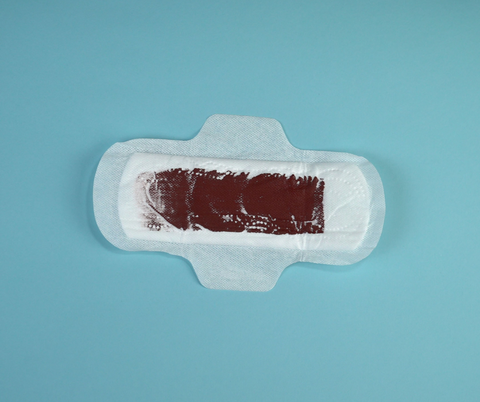What the Colour of Your Menstrual Fluid Could Mean
Ever taken a look down there and wondered why your menstrual fluid was a certain colour? You’ve come to the right place. Varying from bright red to pink, orange and even black or grey, each can indicate a variety of different things going on. Here’s our handy guide to menstrual fluid colours and what they could mean…
Possible Menstrual Fluid Colours
Red
Most likely found on your heavy days. This indicates a steady & healthy flow of fresh blood and most likely passed through your vagina fairly soon after entering your uterus.
You may also find you see brighter red when you’re suffering from cramps. When the uterus contracts, the contractions (that familiar pulsating feeling) lead to heavier blood flow.

Pink
A combination of blood and cervical fluid and usually found at the beginning or end of your bleed.. If you take the contraceptive pill you’ll most likely encounter pink menstrual fluid.
However, if you see pink fluid during other points in your cycle it can also be a sign of weight loss, anaemia or perimenopause so it’s good to keep an eye and make an appointment with your doctor.

Deep Red/Brown
This colour indicates oxidised or “older” blood and most likely appears at the beginning or end of your bleed. Suggesting a slower flow, many find that their blood appears darker as their period progresses, this is because the older blood of the deepest parts of the uterine lining shed later.
Dark red or brown blood can also be seen in the weeks after giving birth, also known as lochia.
If this colour is abnormal to you, get in touch with a healthcare professional.

Orange
Like pink, this can be a sign of cervical mucus mixed with your period blood.
In some cases, orange can also be a sign of trichomoniasis or BV, so if you have any further symptoms, such as itchiness, bad odour or painful urination check in with your doctor.

Grey
Usually a sign of BV, make an appointment with your gynaecologist to be safe.

Black
Whilst black can be a sign of older blood or slower flow or in some cases it can indicate a vaginal blockage. Retained menses (also known as hematocolpos) happens when menstrual fluid is unable to leave the vaginal canal and as the blood is taking longer to leave, it oxidises and darkens in colour.
This can be caused by a possible STI or even a stuck object - remember objects can’t be ‘lost’ inside you or travel to the uterus or abdomen, your cervix only has a tiny opening - such as sex toys, condoms or contraceptive devices. If you are experiencing black menstrual fluid with any abnormal symptoms like itching, foul odour, bleeding during intercourse then see a doctor.

Period Blood PSA
Remember, period blood isn’t just blood. It is made up of the same blood that runs through your veins but it also contains tissue that’s been shed from the lining of your uterus (also known as the endometrium). That’s why its colour & consistency are different to when you cut your finger or have a nosebleed.

Other Things to Notice
Consistency
From thin & watery to thick & gooey, your menstrual fluid consistency can also vary. The lighter & pinker your period, you’ll probably find this at the watery end of the spectrum, whereas the darker & deeper red or brown, chances are it’ll be thick & gooey. This change in consistency occurs towards the end of your period as most of the endometrial tissue has passed.
Clots
You may even encounter some clots during your period. As the endometrium separates from the uterine wall, small blood vessels can tear off and clots form to stop any bleeding which then passes out with your period.
Period blood clots are usually very small, however if you find any larger than 1 inch in diameter get in touch with a doctor as it may suggest menorrhagia (also known as heavy menstrual bleeding).

Any more questions about your period? We’re always here to help! Drop us an email at talktomesister@andsisters.co.uk

















